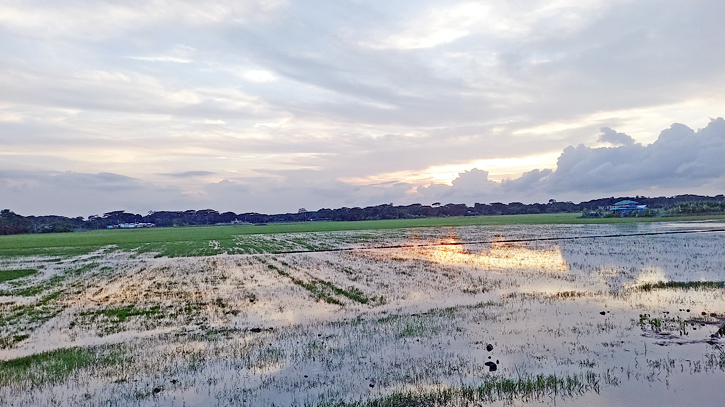
The agricultural land crisis in Char Fasson of Bhola intensifies due to unplanned infrastructure construction and the relentless erosion of the Meghna River. Photo: Messenger
Due to the ongoing agricultural land crisis, farmers in Char Fasson, Bhola District, are being compelled to change their professions.
The agricultural land crisis in this region is intensifying due to unplanned infrastructure construction and the relentless erosion of the Meghna River, leading to a drastic reduction in arable land.
As the amount of cropland shrinks at an alarming rate, crop production is plummeting, causing concern among local authorities. While the current demand for crops in this upazila is met, there is a looming possibility of future shortages, which is a growing worry for the agricultural office.
Local farmers have attributed the diminishing agricultural land to the construction of houses, commercial establishments, and brick kilns on arable land. Additionally, unplanned filling of agricultural land has significantly contributed to the reduction in the production of Aush, Aman, Iri, Boro, and Rabi crops in the upazila.
According to the Char Fasson Upazila Agriculture Office, the region has 85,192 hectares of arable land and 3,337 hectares of uncultivated land. Regrettably, approximately 1 percent of these lands are lost each year due to haphazard housing construction.
Farooq Majhi, a 65-year-old resident of the Meghna River area, lost everything in five landslides and was forced to establish a new home in Hazariganj Union. He vividly describes the constant challenges faced by people living along the riverbanks, including threats to their thatched houses, livestock, farmlands, and even their families' lives. For residents like Farooq, changing their place of residence due to river erosion has become a recurring ordeal.
Another farmer, Sahidur Rahman, aged 57, and his family of six, now rely on fishing from other people's boats. They once had a large house and supported themselves by cultivating their own agricultural land. However, river erosion has left them with no choice but to build a four-story tin house on a mere 4 percent of their land.
Abul Hasem Mahajan, Principal of South Aicha Principal Nazrul Islam College, highlights that agriculture remains the primary source of income for people in Char Fasson Upazila. He points out that the gradual decrease in agricultural land, caused by residential demand and river erosion, is a leading factor in the declining crop production. Mahajan emphasizes the need for a national land use plan and policy to ensure the proper use of land.
Thakur Krishna, Deputy Assistant Agriculture Officer of Char Fasson Upazila, acknowledges that while multi-purpose crops help prevent food shortages in the region, the diminishing arable land poses a potential threat to future food security. With 260,000 farmers in the upazila, many are being forced to change their occupations due to the unplanned filling of agricultural land. There is a pressing need for public awareness on this issue.
Mohammad Salek Muhid, Upazila Assistant Commissioner (Land), reveals that agricultural protection is currently one of the greatest challenges. If the Agricultural Land (Proper Use and Conservation) Act-2022 comes into effect, it will punish anyone using agricultural land for non-agricultural purposes with fines and imprisonment, potentially providing a legal safeguard against the ongoing crisis.
Messenger/Saiful/Sun Yath








